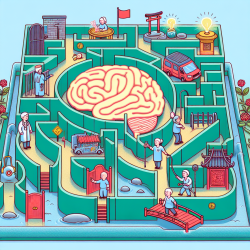In the realm of cognitive health, particularly as it pertains to aging populations, the role of social engagement cannot be overstated. Recent research underscores its significance as a protective factor against cognitive decline. This blog will explore the findings from the study "Life Course Trajectories of Later-Life Cognitive Functions: Does Social Engagement in Old Age Matter?" and offer practical insights for practitioners aiming to enhance their skills and support aging individuals more effectively.
Understanding Cognitive Trajectories
The study identifies five distinct cognitive trajectories among older adults: stable high, stable moderate, stable low, high-to-moderate, and moderate-to-low. These trajectories highlight the varied paths cognitive function can take in later life, influenced by a myriad of factors accumulated over a lifetime.
For practitioners, understanding these trajectories is crucial. It allows for tailored interventions that consider an individual's unique history and current circumstances. By recognizing which trajectory an individual might be on, practitioners can better anticipate needs and provide appropriate support.
The Role of Social Engagement
A key finding from the study is the positive impact of social engagement on maintaining higher levels of cognitive function. Volunteering emerged as particularly beneficial, with those who volunteered more likely to belong to the stable high or high-to-moderate trajectories. This suggests that activities requiring cognitive resources can help delay or prevent cognitive decline.
Practitioners should encourage older adults to engage in social activities that challenge their cognitive abilities. This could include volunteering opportunities that align with their interests and abilities. Such engagement not only provides mental stimulation but also fosters a sense of purpose and community connection.
Implementing Research Findings
- Promote Volunteering: Encourage participation in community service projects or local organizations. Tailor opportunities to match individual interests to maximize engagement.
- Facilitate Social Connections: Organize group activities or social events that encourage interaction among peers. This can help combat isolation and promote mental well-being.
- Educate About Cognitive Health: Provide resources and workshops on maintaining cognitive health through lifestyle choices, including social engagement.
- Monitor Changes: Regularly assess cognitive function and social activity levels to identify changes early and adjust interventions accordingly.
Encouraging Further Research
The study's findings open avenues for further research into the nuanced effects of different types of social engagement on cognitive health. Practitioners are encouraged to stay informed about emerging research and consider participating in studies that explore innovative interventions.
To read the original research paper, please follow this link: Life Course Trajectories of Later-Life Cognitive Functions: Does Social Engagement in Old Age Matter?
Conclusion
The integration of social engagement into care plans for older adults holds promise for enhancing cognitive health outcomes. By leveraging these insights, practitioners can play a pivotal role in supporting aging populations to lead fulfilling and cognitively healthy lives.










